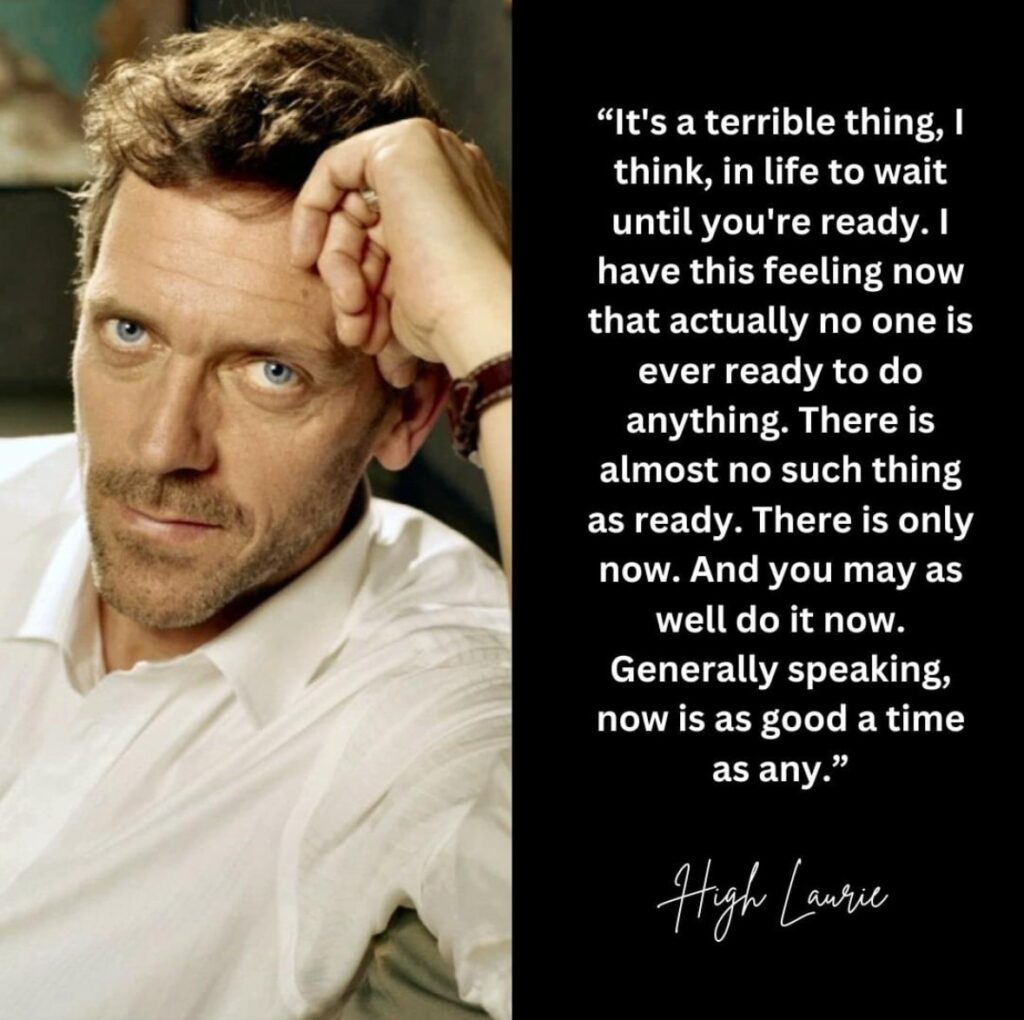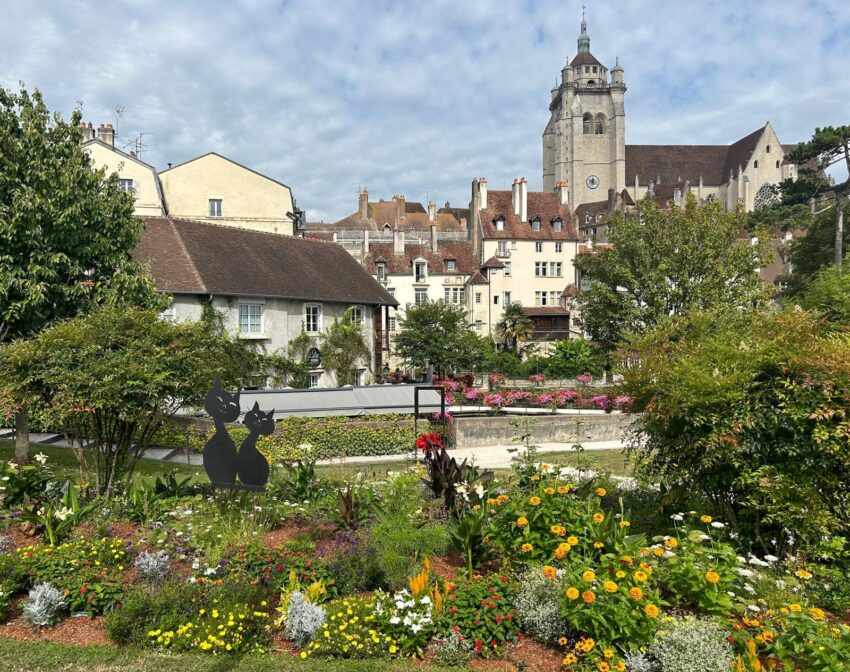Ivan and I are now back in Australia, so this will be our final post about our break from work. The last 15 months on the canals of France have been the most amazing of our lives. We’ve been living our dream. So for anyone else interested in an extended holiday in France we’ve done a summary of our costs, how to get a long term visa, how to buy a boat and a few other things that might be useful.
Of course before we departed France we made the most of Laura our canal boat. We travelled to a beautiful town called Dole, caught up with friends and spent time getting Laura ready to sell so she looks her best for her new owners. Anybody want to buy a boat?
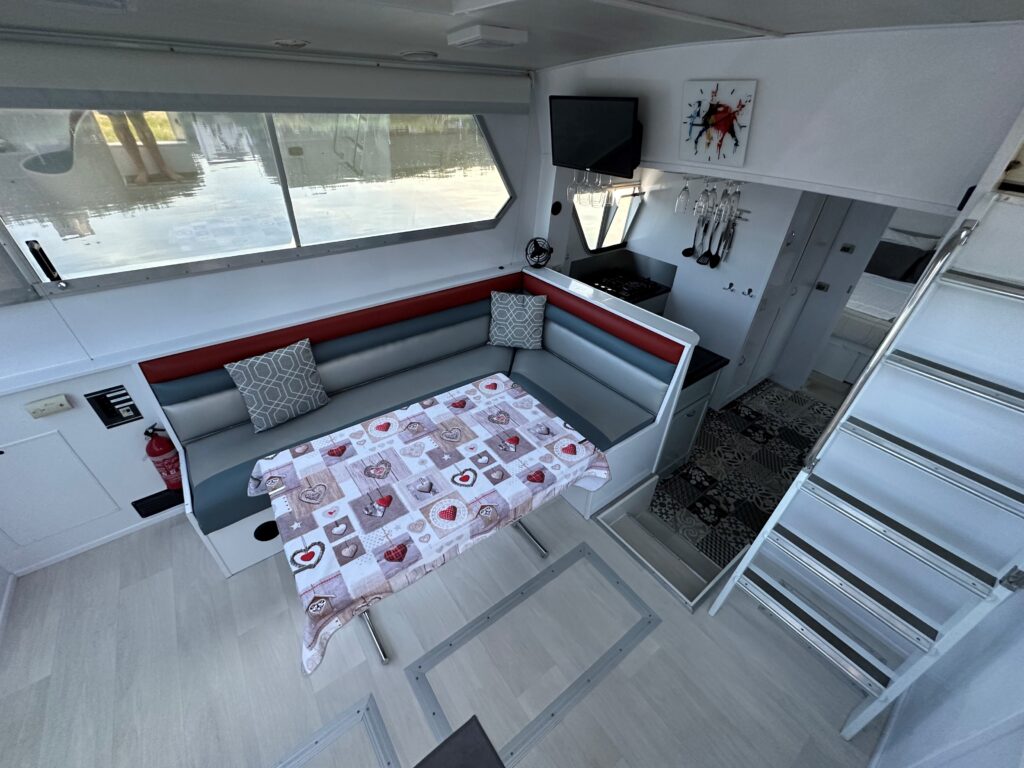
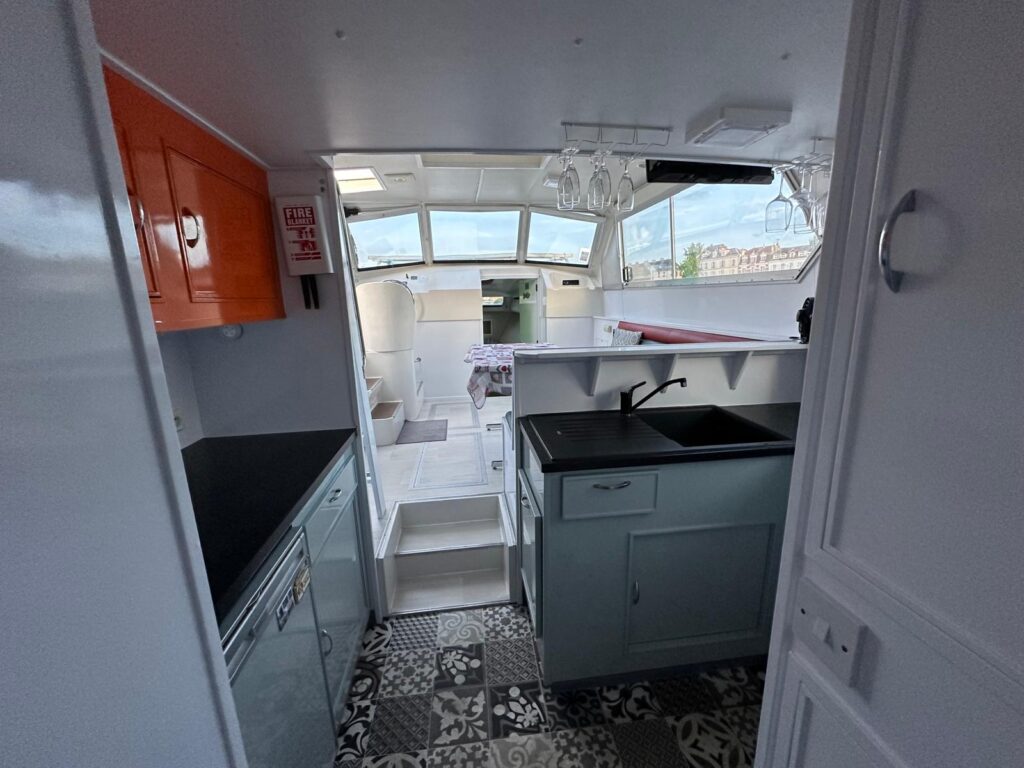
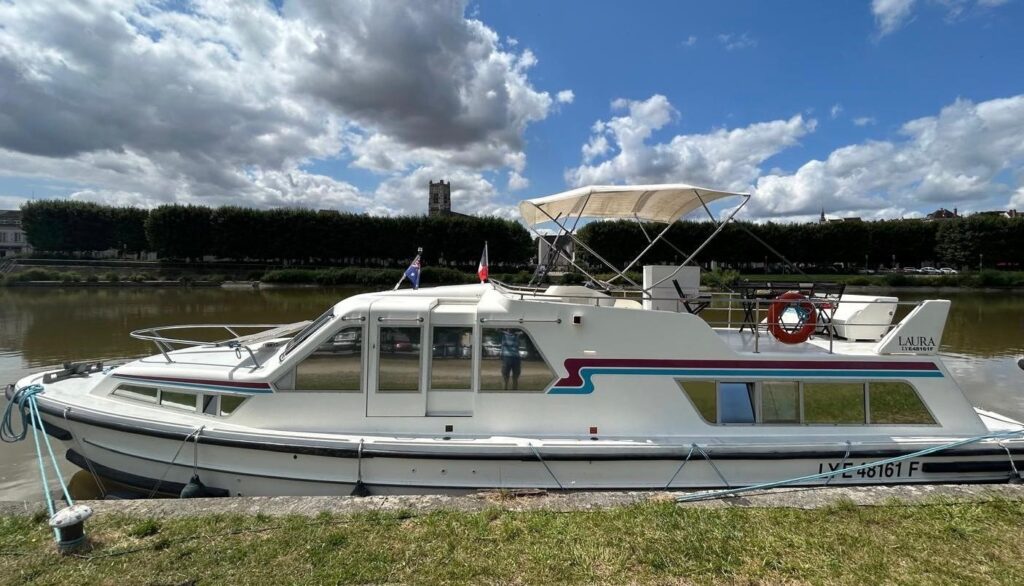
Last voyage
For our last little trip in Laura we decided to head up the Saone River from St-Jean-de-Losne, then we turned into the Canal du Rhone au Rhin until we reached Dole, birthplace of Louis Pasteur. It took less than a day to get there and the weather was perfect!
Dole
Dole is a lovely town that is often called the Venice of France because of the canals that run right through the centre. We’ve been here before and loved it. Hopefully the below videos and photos give you some idea of how lovely it is. It’s a medieval town with a fascinating history, cobblestoned streets and is recognised for its art and culture.
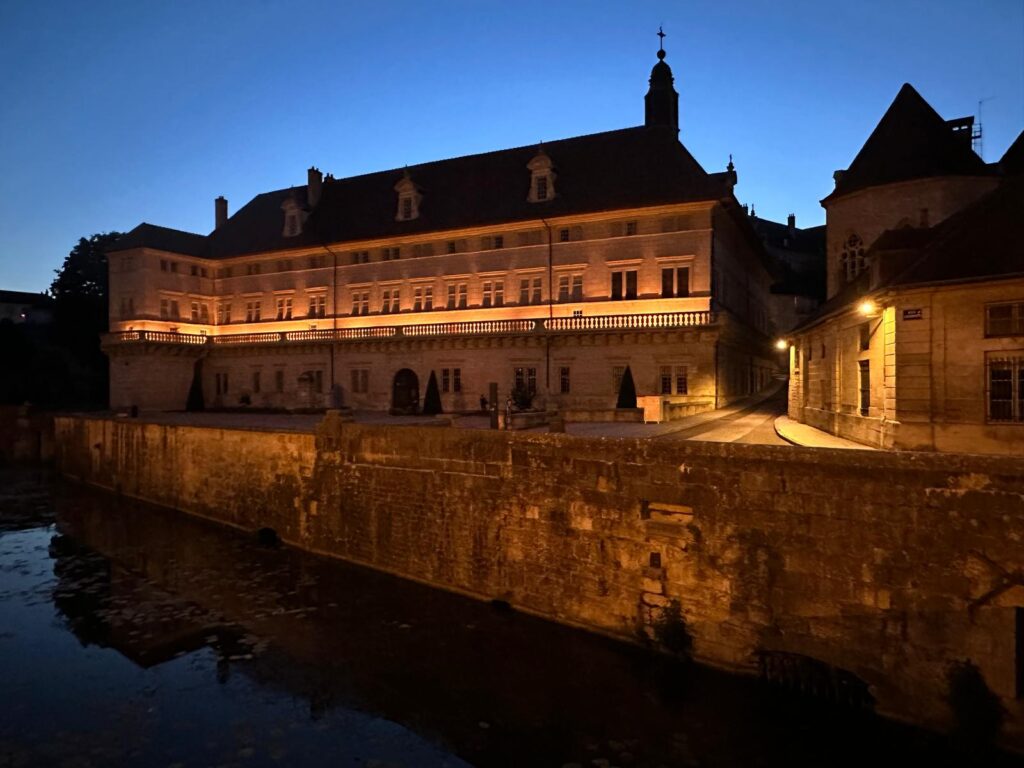
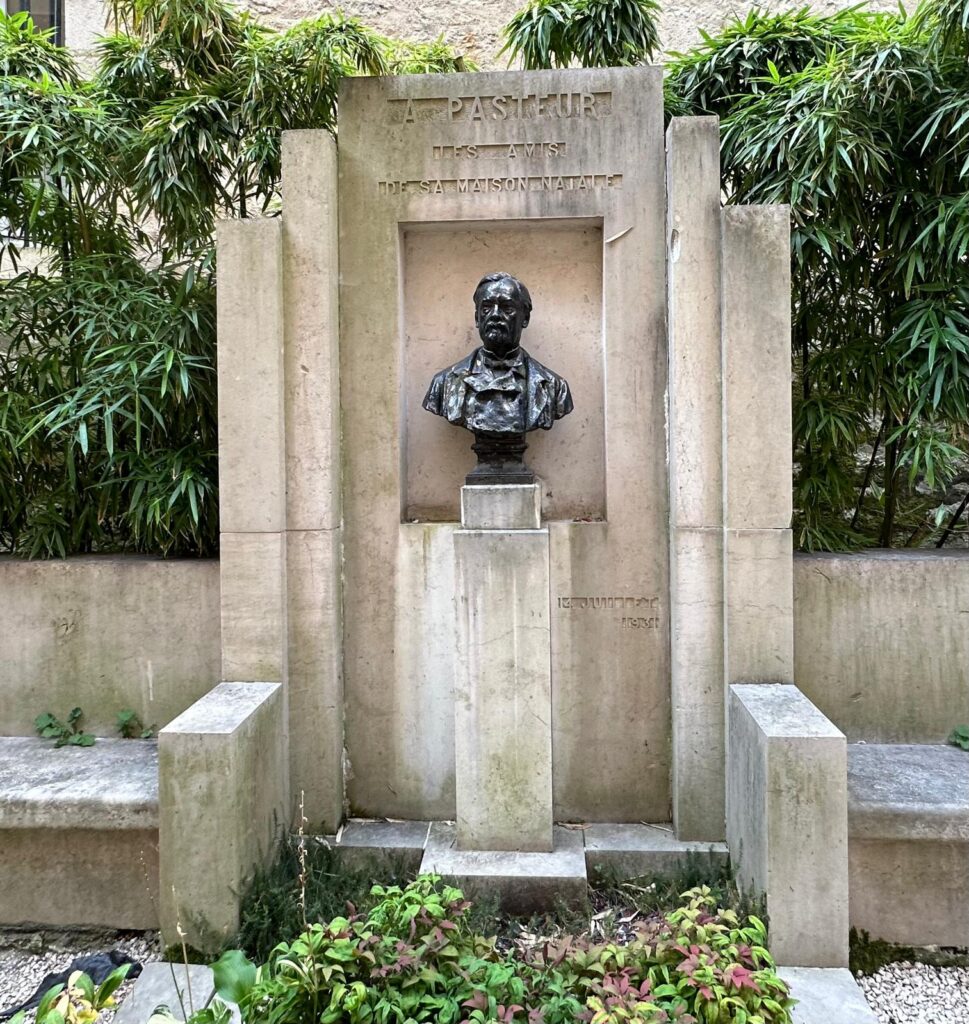
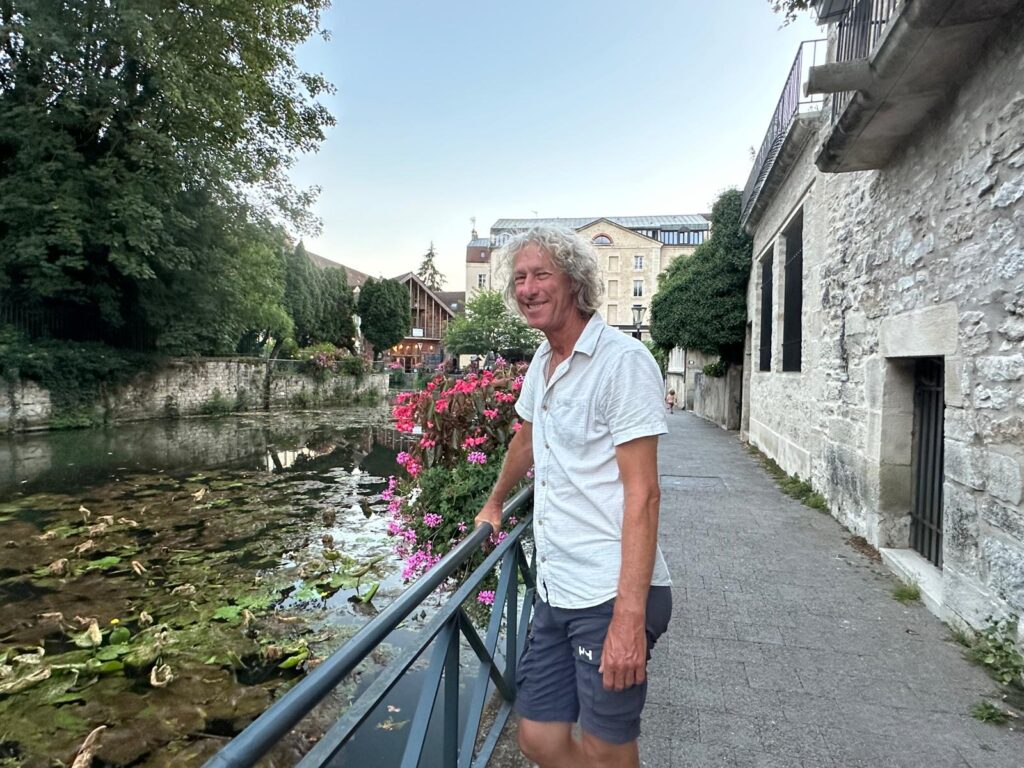
The weather turned cold
And just like that, summer was over. On our way back to St-Jean-de-Losne, which is where Laura will be sold, it started raining and the temperature dropped to about 10 degrees. A few days prior it was 32 degrees! The below video looks cold and bleak, but we still loved it. Ah France, how we will miss you in all your seasons!
St-Jean-de-Losne
Our last few days in France were spent in the marina in St-Jean-de-Losne where we caught up with friends and cleaned Laura from top to bottom. She’s now on the market and ready for someone else to love her like we have. Thankfully, the weather improved and we even had a beautiful sunrise. Ahhh.
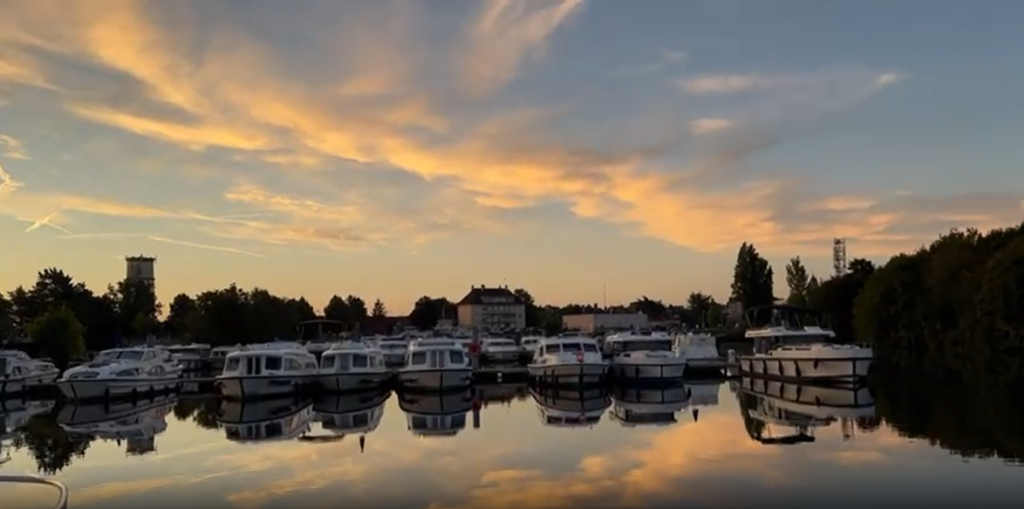
Our voyage on the waterways of France
This next bit of information is for anyone considering buying a boat in France or staying for an extended period of time. You might not realise this but France has over 7,000km of canals and waterways that wind their way throughout most of the country. In our 15 months in France we travelled a total of 1,665km (some of that was travelling up and back on the same canal) and we went through 547 locks. The below map gives you some idea of where we went (the red bits) but you can also see there’s so many places we didn’t get to. Next time! Yes, there will be a next time as we loved it so much.
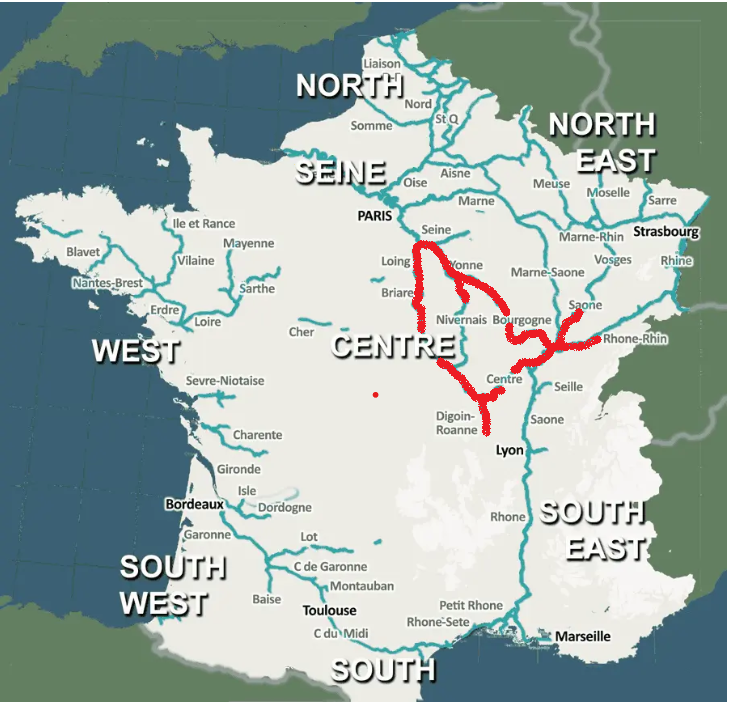
Cost of living on a boat in France
We used an app called TravelSpend to track all of our expenditure. It was excellent and is the reason I can give you an accurate picture of how much living in France cost us. In our 15 month break from work we did some travel outside of France, such as skiing in Bulgaria and sailing in Denmark, which was more expensive than living on the boat. I haven’t included any of those expenses in this part to give you an accurate picture of what it costs to liveaboard.
Our monthly spend while we were cruising on the boat was between €2,000 – €4,000, with an average of around €2,500 ($4,000 AUD). We could easily have cut our expenditure on things such as restaurants and bars but we chose not to. We could also have cut down on the grocery bill too by buying cheaper wine and cheaper cuts of meat but again we chose not to.
A surprisingly large expense for us were the laundry costs. Over 15 months, we spent €1,100 at laundromats so in hindsight we should have bought a €300 washing machine and saved quite a bit. We could also have saved money by not staying in ports and marinas in towns and instead tying up next to a canal bank for free. A more budget-conscious person could easily cut the expenses down by $1,000 AUD per month and still have a great time. This would mean your yearly expenses would be $36,000 AUD.
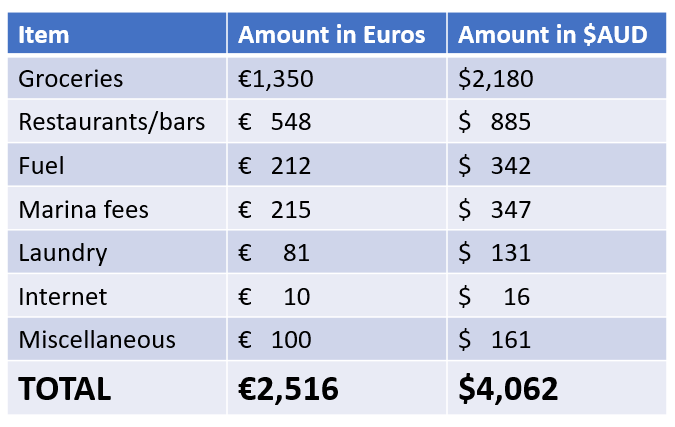
How to buy a boat in France
We bought Laura online through Le Boat Brokerage without having seen her. It was a bit scary doing it this way but we paid €1,100 for an independent surveyor (Daniel Billon) to check her over. The survey was very thorough – Daniel took Laura out of the water and checked everything to make sure she was in good shape. We got a report that was about 10 pages long and then we felt comfortable handing over our money. We also felt comfortable with Le Boat as they are a reputable company.
Whilst we had a great experience buying online, we met many people who had horror stories. There are some dodgy brokers out there! So the best way to buy a boat in France is to look at the boat in person, test-drive it and then get a survey. Most insurance companies require a boat survey, so you should have one for that reason as well. Our survey was worth every penny.
We paid €75,000 for Laura. We could have bought a cheaper boat but we wanted one that we could just hop on and travel and not have to fix up at all. Laura was perfect for us as she had recently been renovated and she never let us down. She’s on the market now for €76,000 because we’ve included absolutely everything with the sale including linen, crockery, tools and even our bikes.
Other boat costs
A few other annual costs to consider when buying a boat. You’ll need:
- Insurance – ours cost around €950 for the year. We use Fluvassur.
- A vignette with the VNF who operate the canals and waterways in France. The vignette is your boat’s permit to use the waterways and locks and costs around €500 annually.
- Maintenance – to keep your boat looking great and functioning well.
Something else to consider is the length of your boat. If you buy one longer than 15 metres it can be a lot more expensive for insurance, marina fees, your vignette etc. Our boat was 12.6 metres long which is plenty of space to live aboard.
CEVNI License
To operate a privately owned boat in France there must be someone onboard who has a CEVNI license. And to get the CEVNI license you need an ICC which is an International Certificate of Competence. The CEVNI test is easy to do online but the ICC has to be done in person as your boat handling competence is tested. It’s actually quite easy to get both. Ivan and I both did our ICC in Manly in Brisbane before we left Australia and then did the CEVNI online.
Winter in France
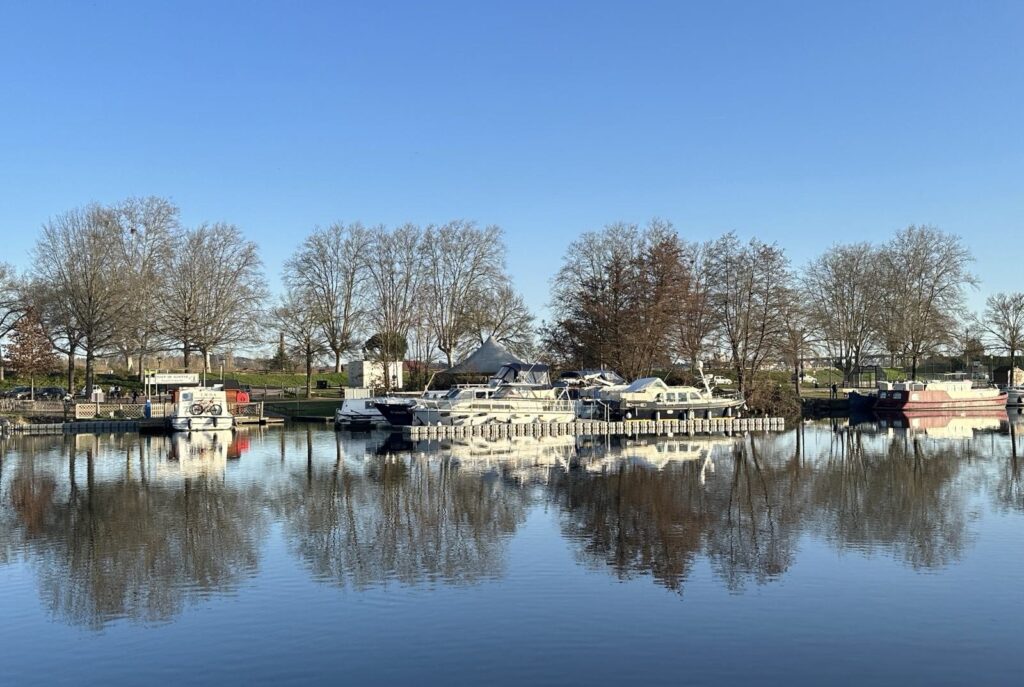
One of the major considerations when you’re buying a boat in France is where you’re going to spend the winter. The canals are closed for maintenance from November though to the end of March so it’s important to find a good place to stay for 5 months. We chose Roanne and we’re so glad we did. It has a very big port with a lot of people living aboard their boat, so we made lots of friends. It’s also a town of 40,000+ people and has plenty of restaurants, bars and fun things to do plus lots of services and shops to maintain your boat. The cost for staying in the port per month was €295 which included water and electricity.
Getting a long-term visa
Australians are allowed to stay in France for three months every six months without any hassle. For those who want to stay longer than three months you’ll need to apply for a long-term visa. We received a VLS-T tourist visa which was valid for 12 months. A day before our visa expired we left Europe (we went to England and had to stay away one night) and then we were able to return to France for the normal three months. That’s how we could stay in France for 15 months.
To get the long-term visa is a bit complicated but we used a great Facebook group called Applying for a French CdS (Carte de Sejour) which helped immensely. Also the website Long Term Rentals in France has a lot of helpful information.
Information needed for the visa
Basically, you have to satisfy a number of conditions to prove that you won’t be a burden to France. This includes:
- Financial independence – you need to prove that you have at least France’s minimum wage in savings or pension payments or whatever your income might be. At the moment that is €1,767 per month per person. If you have children you need to show 50% of the adult amount.
- Private health insurance (not travel insurance). We used ACS Insurance
- An address for the first 8-12 weeks. This can be an AirBNB booking, hotel or a friend’s place but it could also be your boat’s marina
- A letter promising that you won’t work while you’re in France. This includes remote work, which you cannot do on a visitor visa.
- An arrival date. We gave copies of our flights but you could use a train ticket or however you are going to arrive (note, you don’t need return flights)
- A passport with at least 18 months expiry
Once you have all of your documents gathered, translated into French and photocopied you can apply online for an interview through a company called VFS Global. Our interview was in Brisbane but they have offices in each capital city. You can only apply for a long-stay visa no more than 12 weeks before you arrive in France and you have to hand over your passport. VFS send it back to you with your visa attached inside. We only received our passports with our visas three days before we were due to fly out. It was absolutely nerve-wracking waiting but apparently it’s normal. The cost to apply for a visa is €99 each which you can pay in $AUD when you have your interview.
How to get the most out of your experience
A bit of advice for people moving to France – learn as much as you can of the French language prior. Many people believe that all French people can speak English. This is not true. Many French people learnt English at school but I would say the vast majority of locals are not in any way fluent and feel embarrassed to speak English in case they make a mistake. Paris is different – I would say a large majority can speak English fairly fluently.
So if you want to have a wonderful time in France then learn as much French as you can and at least try to speak it. Ivan and I are certainly not fluent but we can hold conversations and we’re learning all the time. French people appreciate this and we’ve made lots of French friends.
Another thing to remember if you’re Australian or a Kiwi is that French people generally love us! So make sure you mention where you’re from early in any conversation and you’ll invariably get a great response. Say it in French – “Nous sommes en vacances de Australia” (We are on holiday from Australia) and normally you will hear “Vraiment! C’est tres loin!” (Really! It is very far away!). They appreciate that Australians and Kiwis have travelled so far to visit their country.
Also, they love that the ANZACs fought with them in World War I and II. They recognise the bravery of our soldiers and the sacrifices made on French soil. We had many French people say to us “Australians didn’t need to be here, but you came and you helped save us”. There is a town called Villers-Bretonneux on the Sommes which has a sign that says “N’oublions jamais l’Australie” (Let us never forget Australia). 1,200 Australian soldiers died here in 1918 and they have never forgotten. It makes me so proud of our Diggers and so very grateful.
A final note
We absolutely loved our break from work in France and would recommend it to everyone. Taking time out of our careers to relax, unwind and experience a new way of life was extraordinary. We feel refreshed and ready for our next adventure back at work in Australia. As for our plans, we’re already thinking about our return to France in 5 years or so, where we will buy another boat and stay longer. That’s how much we loved it.
I sincerely hope you get the chance to have a break from work like we did and have a big adventure. After all, life is short and you don’t know what is around the corner. I also hope to see you out there on the canals of France one day. Thousands of people from all over the world are living on a boat in France right now. It’s not expensive and it’s easy to handle a boat on the canals. It’s a wonderful life.
Merci for following our adventure. If you want to know more detailed information feel free to email me on ali.davenport1@outlook.com. I’ll leave you with a quote from the wonderful actor Hugh Laurie. Au revoir.
